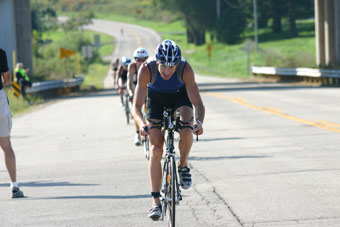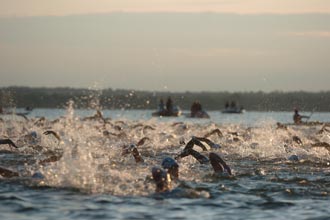For these Badgers, Ironman is the ultimate physical test
Swim, bike, run — sounds like a fun, active weekend. But for those participating in Sunday’s Ironman Wisconsin, it’s a test of their endurance and will to finish a 2.4-mile swim, 112-mile bike and 26.2-mile run, all within 17 hours.

Chemistry professor Thomas Brunold hopes to finish near the top of the 2,500 amateurs competing in Sunday’s Ironman Wisconsin.
As it has in the past, the course traverses Observatory Hill and Camp Randall. UW–Madison students, faculty and staff are well represented among the 2,500 participants. Chemistry professor Thomas Brunold has been a top 10 finisher on multiple occasions in recent years. Most, however, have more modest expectations — such as surviving a grueling day.
Brunold’s first triathlon was also his first Ironman, Lake Geneva in 2001. He’s since competed in Ironman in Wisconsin, Lake Placid and Hawaii. He’ll compete in Ironman Hawaii again on Oct. 8, then will take a break from training.
Brunold got into Ironman because he was looking for a challenge, he says. “What kept me going was my desire to become better and faster and to get closer to my limits.”
Brunold has continued to push his limits, improving every year. He finished eighth overall at Ironman Wisconsin 2003. “Since then, one of my goals for IM Wisconsin has always been to place near or at the top of the approximately 2,500 amateurs, and in Hawaii I try to make the podium in my age group (that’s top five), which I managed to do in 2004 (fifth) and 2009 (third) but barely missed in 2007 (sixth),” Brunold says.
He focuses on efficiency when training, biking to and from campus for work. He says that he spends about 90 minutes each day swimming, biking and/or running, except for Saturday, when he bikes and runs four to five hours. “This is certainly less than what the average Ironman triathlete trains,” Brunold says.
Like Brunold, in 2010, Chris Moss had never completed a triathlon before competing in Ironman Wisconsin — and he hasn’t competed in any other races since his Ironman finish. “When I tell other triathletes that, they look at me like I’m crazy — even the crazy people who do Ironman! It really comes down to preparation though; most anyone can complete an event like this with proper training,” says Moss, a Ph.D. student in educational leadership and policy analysis.
Moss’s 2010 training was a little different than most, in that he spent the summer in Nepal and Indonesia and tried to fit Ironman preparation into his travel plans.
“I started in Indonesia and quickly learned that vacationing and serious training didn’t mix well,” he says. “I spent about two weeks trying to balance the two, and eventually decided to spend a few days in one spot on the northern coast of Bali and get my act together.”
Those few days turned into a month and a half, in which Moss would wake up, swim, eat breakfast, bike, eat lunch, then run. Toward the end of his time in Indonesia, Moss was swimming two hours a day in the ocean, riding his bike six hours up and down the side of a dormant volcano, then running four hours along the coast.
Moss is back for this year’s Ironman, but this time he trained in Madison. “Next year I may try to balance the two by going away for only a month or so,” he says.
If it sounds like Ironman training can become like a full-time job, that’s because it does. Jennifer Boyce, an assistant researcher with the School of Medicine and Public Health, signed up for Ironman — her first — because it falls on her 30th birthday. She admits that it was sometimes challenging to fit training in with work and an adequate sleep schedule.

Jennifer Boyce displays the signup sheet for her Ironman Wisconsin entry. This weekend’s event is her first Ironman — and she’ll be celebrating her 30th birthday as well.
“I quit watching TV because I usually didn’t have time, and if I sat down I’d normally just fall asleep,” she says. “But it was easier with a supportive spouse and furlough days.”
Boyce has spent the last nine months training, waking up earlier to get workouts in, sometimes working out twice a day. She swims two or three times a week and bikes and runs three to four times a week. She had competed in sprint and Olympic triathlons and half marathons before signing up for Ironman, and she completed a marathon and half Ironman as part of her training.
Brunold, Boyce and Moss all list the Lakeshore Path as a favorite campus running route. Boyce enjoys biking at the Arboretum, while Moss tries to stay west of Madison for his bike training because of the larger hills. “For swimming, I just stay in Lake Monona and hope I don’t get run over by a boat,” says Moss. Boyce took a master’s swim class at Monona Grove High School, then began swimming in Lake Monona with teammates from Endurance House once it was warm enough. Brunold likes to swim at the SERF.
Now, with the race just a few days away, training is over. The athletes’ focus now is on relaxing and staying focused on their goals.
“I’ve pictured myself crossing the finish line numerous times,” says Boyce. “Veteran racers said the best thing to do is break the day up into smaller increments and not think about the whole day. I think I’ll be anxious at the swim start, thinking about the day ahead and the 2,500 other people surrounding me who are heading in the same direction as me. I’m still nervous about finishing. I know I can do it, [I’m] just wondering how bad my legs are going to hurt during the run.”
Moss says that the fan support makes a difference. “The fans here in Wisconsin are known as some of the best in the Ironman circuit. Last year, I’m pretty sure I had a smile on my face most of the time because of what was going on with the spectators,” he says. He hopes to push himself harder this year now that he knows what to expect.
“I’m confident with my abilities … I know my body won’t break down, but in the end, it’s all about finishing, one way or another,” Moss says.

Ironman Wisconsin participants complete the 2.4-mile swimming course in Lake Monona.
Photo: Ironman
Brunold agrees. “The No. 1 goal for every Ironman is to finish,” he says. “This is such a long journey, which means that so many things can — and some will — go wrong. Goal No. 2 is to finish the race feeling that I gave everything I had on that particular day. My family, especially my wife, Laura, makes big sacrifices to accommodate my work and training schedules, so the least I can do to show them my appreciation is to make sure I give it my best.”
And for those interested in training for a triathlon? Brunold says, “Go for it! Triathlon training is fun, and the health benefits are huge. There is a great triathlon community here in Madison, so finding a group to train with should be relatively easy. Because most of the time spent in a triathlon is spent on the bike, it is important to enjoy cycling when preparing for this type of race.
“Because most of us don’t get paid to race triathlons, training should always be fun, albeit tough at some points,” Brunold adds. “Finishing a challenging workout can be as rewarding as winning a race.”
Portions of the Ironman route pass through campus, so traffic patterns will be limited to accommodate racers (see map). Spectators can cheer on racers on campus between Lake and Park streets or along Observatory and Babcock drives. Messages from friends and family will be posted along the “Motivational Mile” between Lot 60 and Lake Mendota Drive.
For more information, visit http://ironmanwisconsin.com.
